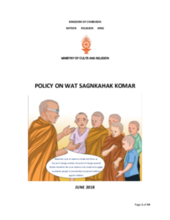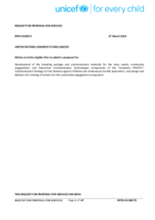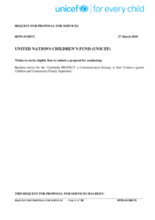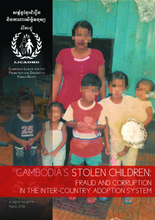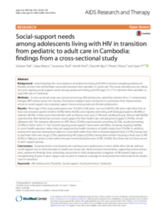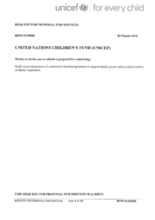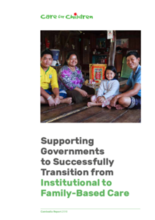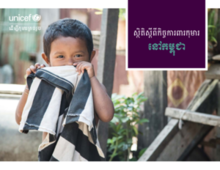This country page features an interactive, icon-based data dashboard providing a national-level overview of the status of children’s care and care reform efforts (a “Country Care Snapshot”), along with a list of resources and organizations in the country.
demographic_data
childrens_living_arrangement
children_living_without_bio
social_work_force
key_stakeholders
Key Stakeholders
Add New DataOther Relevant Reforms
Add New Datadrivers_of_institutionalisation
Drivers of Institutionaliziation
Add New Datakey_research_and_information
Key Data Sources
Add New DataMapping of residential care facilities in the capital and 24 provinces of the kingdom of Cambodia
National estimation of children in residential care institutions in Cambodia: A modelling study
Prevalence and number of children living in institutional care: global, regional, and country estimates
Shaping the national social protection strategy in Cambodia: Global influence and national ownership
Towards a Social Protection Strategy for the Poor and Vulnerable: Outcomes of the consultation process
Country Care Profile: Cambodia
Acknowledgements
Data for this country care snapshot was contributed by partners at Family Care First and UNICEF Cambodia.
Displaying 121 - 130 of 285
This Wat Sangkahak Komar policy (or Child Safeguarding Policy) is part of the comprehensive mechanism within pagodas in Cambodia to respond to suspected and reported cases of violence against or abuse of children.
UNICEF has issued an RFP inviting eligible firms to submit a proposal for Development of the branding package and communication materials for the mass media, community engagement, and Interactive Communication Technologies components of the ‘Cambodia PROTECT: Communication Strategy to End Violence against Children and Unnecessary Family Separation’, and design and delivery of a training of trainers for the community engagement component.
This article from Bright Magazine tells the story of Ly Seav Meng and other children who are placed in the care of orphanages in Cambodia, not because they are parent-less, but because their parents see it as the only way to provide education and opportunity for their children.
UNICEF has issued an RFP inviting eligible firms to submit a proposal for conducting a Baseline survey for the ‘Cambodia PROTECT: a Communication Strategy to End Violence against Children and Unnecessary Family Separation’.
This report from the Cambodian League for the Promotion and Defense of Human Rights (LICADHO) presents the stories of three Cambodian women whose children had been adopted overseas at different times over the last 15 years and exposes corrupt and fraudulent practices in Cambodia's Inter-country adoption system.
This study describes access, utilization and ongoing social support needs among adolescents living with HIV aged 15–17 in transition from pediatric to adult HIV care in Cambodia.
UNICEF has issued a request of proposals (RFP) for an institutional contract to conduct a study on good practices of community-based programmes to support family preservation and prevention of family separation in Cambodia.
The Global Social Service Workforce Alliance is seeking a national-level consultant for a mapping and assessment in Cambodia, China, Indonesia, Mongolia, and Vietnam.
This report provides a summary of research methodology and details of meetings and data collection from an October 2017 research visit to understand the current child welfare system in Cambodia, in particular the role and function of the Government residential care institutions (RCIs). The report presents findings and recommendations for pathways forward for government-led foster care development.

